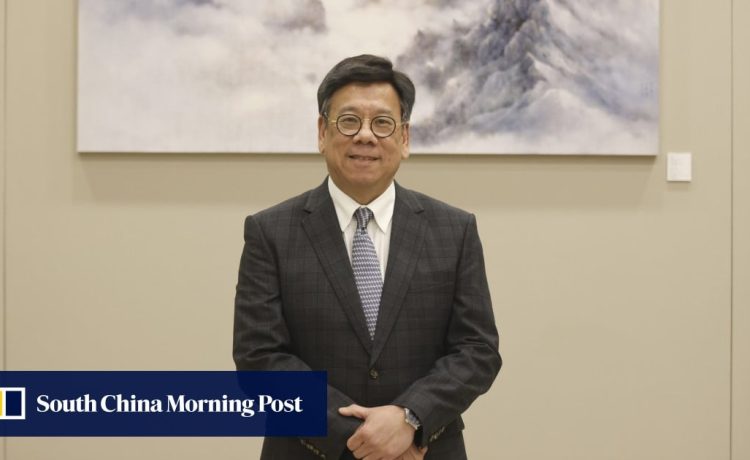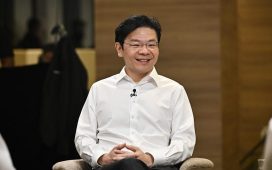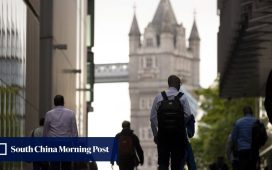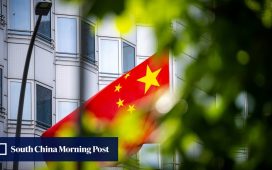Washington sanctioned Lee in August 2020 along with 10 other officials for their role in the imposition of the national security law, which it said curtailed Hong Kong people’s freedoms. Hong Kong authorities earlier this week announced that Lee would not attend the forum in San Francisco because of “scheduling issues” and despite receiving a “personal invitation”.
On Friday, US lawmakers introduced a bill urging the Biden administration to expand its sanctions list to cover 49 Hong Kong officials, judges and prosecutors, to hold them accountable for “human rights violations” under the national security law.
In the interview, Yau brushed aside concerns that the sanctions against Lee negatively affected the relationship between Hong Kong and the US, saying trade ties were “ongoing” as reflected in his exchanges with American enterprises and business chambers.
AmCham hails court rejection of bid to ban ‘Glory to Hong Kong’ protest song
AmCham hails court rejection of bid to ban ‘Glory to Hong Kong’ protest song
“We have very encouraging discussions with the chambers,” the 64-year-old minister told the Post. “They have very positive views regarding the business opportunities in Hong Kong.
“And actually, we are seeing quite a big number of companies in the US doing business in Hong Kong. The number is not reducing significantly. And there are new businesses coming in as well.”
Yau did not provide further figures or details. He expressed confidence that the government’s plan to enact its own national security law by next year, as spelled out in Article 23 of the Basic Law, the city’s mini-constitution, would not erode trade ties. “I have no concern at all about what you mentioned about national security,” he said.
“Seeing is believing when [American businesspeople] are in here,” he said. “They know … [the law] is for the stability of Hong Kong to protect the civilians and the businesses.”
US lawmakers introduce bill calling for sanctions on Hong Kong officials, judges
US lawmakers introduce bill calling for sanctions on Hong Kong officials, judges
Beijing imposed the national security law on Hong Kong in 2020 in response to the months of protests in 2019, setting out legislation that punishes crimes of secession, subversion, terrorism and collusion with foreign organisations.
All eyes are on the Apec summit in a week’s time as the planned meeting between Chinese President Xi Jinping and US President Joe Biden will shed light on whether Washington and Beijing will take concrete measures to work towards easing tensions.
Yau said that during the summit’s ministerial meeting, which he will attend on November 14 to 15, he would promote Hong Kong to his Western counterparts by highlighting the financial hub’s rule of law, free flow of capital and its role in the Greater Bay Area, a national blueprint aiming to turn 11 cities into a global economic powerhouse.
In 2021, a survey by the American Chamber of Commerce in Hong Kong found that 42 per cent of its members considered or planned to leave city, with more than half citing their discomfort with the security law.

Another survey released last year, by InvestHK and the Census and Statistics Department, showed there were 8,978 foreign companies in Hong Kong, marking a decrease of 71 enterprises compared with the same period last year. Among them, 1,258 were from the US.
InvestHK is a government department under the commerce minister’s oversight to boost foreign direct investment. Together with the overseas bureaus it operates, there are 65 outposts, including the government-run Economic and Trade Offices and the Hong Kong Trade Development Council’s offices, supporting businesses outside the city.
Yau revealed that two more consultancy offices under InvestHK were being planned to be added to the network. They will be located in Egypt and Turkey, with an aim to strengthen ties with countries in China’s belt and road plan.
He explained that Turkey had a strong economy in the region as a connecting point to the West and Africa, while a further assessment would be made to ensure Egypt remained a “safe” destination despite the Israel-Gaza war.
‘Scheduling issues’ to keep Hong Kong leader John Lee from Apec summit in US
‘Scheduling issues’ to keep Hong Kong leader John Lee from Apec summit in US
The official said there was no timeline yet on when the offices would be set up, and that authorities had not commenced talks with their counterparts.
InvestHK works with the Office for Attracting Strategic Enterprises (OASES), under the Financial Secretary’s Office, to attract strategic inward investments. Last month, the government signed cooperation agreements with the first batch of 20 firms to set up or expand their businesses in Hong Kong as part of a push by OASES.
They included UK pharmaceutical giant AstraZeneca, China’s tech titan Huawei and food delivery platform Meituan. Eighty per cent of them were from the mainland.
As announced in the 2022-23 budget address, InvestHK has been allocated additional recurrent funding of about HK$90 million (US$11.5 million) to implement promotion strategies at key global target markets.
The estimate for the department in 2023-2024 is HK$278.2 million, 22.7 per cent higher than last year’s figure.







